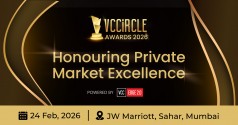Overview
The event, which saw attendance from over 300 investors, bankers, entrepreneurs, companies, lawyers and consultants, saw 18 panelists sharing their thoughts on topics ranging from the emergence of growth capital private equity to the hottest opportunities in India over three sessions
PANEL 1: Is Indian Private Equity All About Growth Capital Investing
The event kickstarted with a discussion on Is Indian private equity all about growth capital investing . Abizer Diwanji , Executive Director-Advisory, KPMG, who moderated the panel, gave a snapshot of the private equity landscape in India, and how it all grew from just a little over $1 billion in 2002 to more than $12 billion now in total private equity investments in the country. That is the coming of age of one industry. He also showcased numbers showing how the growth stage deals are growing in number
Subbu Subramaniam , Investment Partner, Baring private Equity, discussed various concepts of venture capital and private equity - such as angel or start-up funding, mezannaine, buyout and even “turnaround” funds. In India, they can be looked at as: seed stage or the early stage when the amount sought is by the company which has registered no revenues. When the amount sought is two to three times the annual revenue of the company, it is then that the company is at the growth capital funding stage. Then there are buyouts, where PE funds take a majority stake, and turnaround funds, which invest in companies that are not doing well. There still exists the mindset “Why should I take money from PE people, when I can borrow?”. There is need for a strategic shift in the mindset where entrepreneurs soon begin to realise that it is not only about money but about wishing to grow “exponentially”, and leverage the managerial expertise of the investors.
George Thomas , Partner, India Value Fund, a Mumbai based private equity fund with $600 million under management, talked about his fund’s experiences in India so far, and what strategy they intend to follow in the future. India Value Fund has a unique investment strategy which is the “Buy & Build” philosophy, where the fund engages with the company deeply, transform its business and generate revenues through “operational excellence”. Thomas presented a case study of one of its portfolio companies, Trinethra Retail, a 68 store grocery retail chain, in which IVF bought a controlling stake of 80 per cent and expanded it to a retail chain with four times the existing number of stores, three times the revenues and finally exited by selling it to a large group as a platform for entry into retail sector.
Nikhil Khattau , Managing Director of Mayfield Fund, a Silicon Valley based venture cum growth capital fund, talked about the correction in stock market and its impact on the valuations of the unlisted private equity plays. His view has been that the market correction has brought down the valuation expectations of entrepreneurs to realistic levels. “The sentiment is fairly negative owing to a global slow down, and this is the time for PE investors to wait and watch.” However, that will not affect the funds flow, according to him. “There will be a large supply of PE money coming to India in future.”
Niren Shah , MD, Norwest Venture Partners, said that there were unrealistic expectations in the minds of the entrepreneurs which need to come down as the markets have tempered. He added that private equity is the way to go - be it listed or unlisted companies. PE investing is more about relationships where the investors sit on the Board to advise, take the marketing calls, leverage relationships, channel partnerships, and which keeps the model intact and scalable.
Kartik Parija , Managing Director, Zephyr Peacock, an SME focused private equity fund, spoke about the private equity investing in Indian SMEs. He was of the view that PE money can help Indian SMEs scale up. He gave an example of Time Technoplast, one of Zephyr’s investment companies, which is now listed and is eyeing turnover in hundreds of crores.
PANEL 2: Entrepreneur - PE/VC Partnership
Shiraz Bhugwadia , Director, o3 Capital Partners, moderated the session on entrepreneur and PE/VC partrnership. Deep Kalra , founder and CEO Makemytrip.com, shared his fund raising experiences - both in boom and bust phases. Remembering the initial days of fund raising for Makemytrip.com, Kalra sad funding was easy in the dot-com days and VCs followed a set model – what worked in the US and China would work in India – mindset. The initial years of ’99 – ’01 were a learning curve for both the VCs and entrepreneurs. He remarked that the VC’s didn’t look out for the signs of the imminent crash facing them. His experiences of the dotcom bust days taught him that funding depends a lot on the investment climate. He said it was easy to raise capital in 2000 when there was a euphoria. Everyone was following a herd mentality. Deep shared some lessons for both VC’s and entrepreneurs. He said one needed to attach more value to the venture capitalist personally than the VC firm. You need to have the right chemistry with the firm. VC-entrepreneur relationship is based on mutual trust, they both have a symbiotic relationship – which is very important for both to understand each other. Amongst his tips to entrepreneurs, he advised them to be thorough with their research, visiting fund websites is not enough, an entrepreneur should do a reference check on the VCs, talk to the promoters of the companies they have funded earlier and so on.
He said entrepreneurs need not get an investment banker if they can do the work themselves. But if they do, they should not pay ridiculous sums like 3 per cent of the funds raised. Entrepreneurs should take a focused approach while scouting for VCs, talk to one fund at a time, don’t run after 15-20 funds, have a very focused approach. In the end, he stressed if the business model is good, then a VC will come calling.
Subba Rao , Chairman, Robo Siliocn (India value Funded) added the following tips given by Kalra. He stressed entrepreneurs should introspect before deciding to get funding. Maintaining transparency with the investors is very important. Investors have a specific purpose, it is advisable if the investors and entrepreneurs discuss their agendas before a partnership is formed. Entrepreneurs should also discuss the investors’ exit plans. It is also very important for the entrepreneur to separate family responsibilities with that of the business.
Cyrus Driver , MD, Helix Investments, brought his valuable experience of an entrepreneur and a VC. He gave an 11 lesson presentation. He stressed on an entrepreneur getting a CFO, they are worth the cost to the company, and will get 10-15 times the business. Second lesson, pitch your business plan to the top level professionals (Partners, Directors) in the company hierarchy. Third lesson, be conservative, don’t over promise, to claim more value. Lesson four, entrepreneurs should get realistic at the bargaining stage. Lesson five, flattery goes a long way as VCs are consumed with self doubt and a little praising of the VCs ego will go a long way. Lesson six, entrepreneurs should ensure their exit rights. Lesson seven, he advised to get a good investment banker to raise funds, he’ll not only introduce entrepreneurs to right investors but also fine tune the business plan. Lesson eight, ‘Don’t expect too much from the Investors’, VCs also have a herd mentality, they too jump onto the ‘hot’ sector They value add in certain limited areas. Are good at asking questions but not good at providing answers.
Lesson nine, he agreed with all the previous panelists, on being transparent with the investor, be the first one to deliver bad news and give a realistic and accurate estimates, ‘Honesty is the best policy’. Lesson 10, ‘ Focus on your core areas’. VCs are not excited when an entrepreneur presents a venture which is a new area for him too. Avoid unrelated diversification. Lesson eleven, avoid clichés like ‘Hockey Stick’, ‘Inflexion Point’ and ‘Low Penetration/ Low per capita consumption”.
Kuntal Shah , Co-founder, Axis Holdings, added to the above points: investors and tax auditors roles are alike, raise money when you need it the least, learn about capital raising, add value and clarity of thought and lastly have a realistic value of your business.
Shirish Deoadhar of N Factorial Services said “pain killers sell (in India) and not vitamins”. He pointed out the fact that as long as the product or the service caters to a problem and emerges as a problem- solver to it, it will go a long way. A plan coming from the entrepreneur should be self reliant, and should not bank on VC funding.
Agenda
SPEAKERS
George Thomas , Partner, India Value Fund
Subbu Subramaniam , Partner, Baring Private Equity
Nikhil Khattau , MD, Mayfield Fund
Srini Vudayagiri , MD, Lightspeed Venture Partners
Cyrus Driver , MD, Helix Investments
Gaurav Mathur , MD, India Equity Partners
Deep Kalra , CEO, MakeMyTrip
Niren Shah , MD, Norwest Venture Partners
Kartik Parija , MD, Zephyr Peacock
Shantanu Surpure , Managing Advocate, Sand Hill India Advisors
Subba Rao , Chairman, Robo Silicon
Abizer Diwanji , Executive Director, KPMG
Shiraz Bhugwadia , Director, o3 Capital Partners
Kuntal Shah , Co-Founder, Axis Holdings
Jasmin Patel , Managing Director, Fidelity International
Venue :
Le Meridien, Pune
Le Meridien, Pune
Do you have any queries?
Drop us a line and we will call you.



